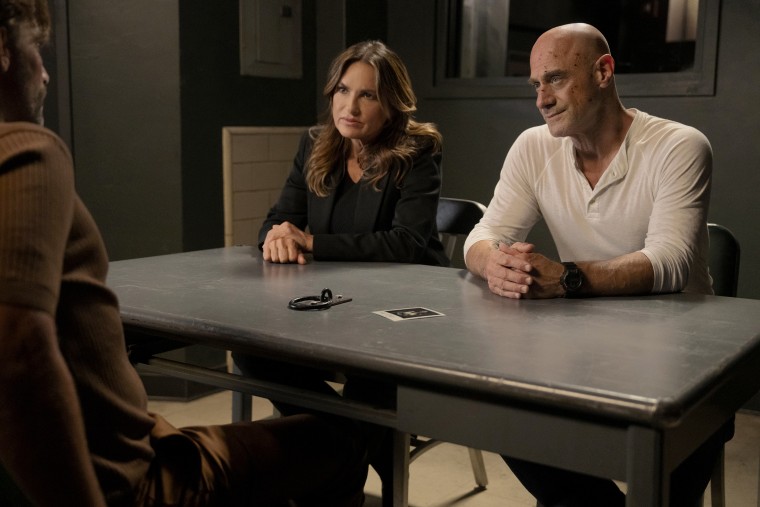Warning: This post contains spoilers for Season Five of “Law & Order: Organized Crime.”
“Law & Order: Organized Crime” star Chris Meloni took Season Five into his own hands — literally.
The actor, who also serves as an executive producer on the series, wrote the second episode of the new season, “Dante’s Inferno,” which premiered Thursday, April 17, on Peacock.
(Peacock is part of our parent company, NBCUniversal.)
One of the most unique elements of the hour is the series of dreams his character, Detective Elliot Stabler, has while in a coma. In Episode One, “Lost Highway,” Stabler gets hit by a semitruck while in the driver’s seat of his truck, which also has a little girl, Bunny, he rescued hiding out in the back seat.
Stabler is undercover at the time of the accident while his team at the Organized Crime Control Bureau investigates a biker gang using trucking operations to transport weapons and drugs. There’s also another layer to the madness, as some of the men involved appear to be sex trafficking young girls, which is why Stabler gets concerned when Bunny goes missing before he saves her.
As the first episode rolls into the second, Stabler is wheeled into the hospital and experiences his first of many dream sequences. He’s calling from his bed for a nurse in a scene that’s clearly set decades earlier, based on visuals including the uniform on a police officer who walks by (a reference to Stabler’s late father, maybe?). Then Stabler sees a bunny in the hallway before he hears a voice calling his name. The voice belongs to Capt. Olivia Benson (Mariska Hargitay), his former longtime partner at the Special Victims Unit. He calls for her, and her voice shouts back, “I’m here! I’m here!” Back in the real world, Benson actually is there, at Stabler’s bedside while he’s in a coma.
“I wrote it from, obviously, Elliot’s perspective and what are the imageries that are rattling around in his noodle,” Meloni tells TODAY.com of his thought process for crafting the script for the episode, “and how much of it is the trauma?”
A second dream shows the girl he saved earlier, Bunny, telling him to find a missing woman, nicknamed “Sad Eyes.” A later one again shows the old-school cop walking the halls and Bunny dead under a sheet on a table in the hospital (Benson later informs Stabler Bunny did die after the accident). In Stabler’s final dream, he’s in his hospital bed with Benson beside him staring at him intently. He asks her what’s wrong, and she gets up and walks out of his room without answering.
“Liv, don’t leave!” Stabler shouts after her.

“My intention was for each person to have their own intention,” Meloni says when asked about the purpose of including Stabler’s dreams and what they mean.
“I try not to spoon-feed, because I think in the end that’s not as nourishing or satisfying for the person. I like it,” Meloni adds. “I like people to lean forward and go, ‘OK, what the heck was that? And why?’ And have, just, differing opinions about it.”
When pressed about if the throwback hospital and police uniform imagery is supposed to symbolize Stabler’s father, Joe Sr. — who was also a cop and eventually took his own life — and the possible guilt associated with that relationship, Meloni jokes, “Give me the answer! You can’t handle the truth.”
He remains similarly vague about if Stabler’s guilt increases with each dream, like how in Dante Alighieri’s “Inferno” the circles intensify the further he proceeds on his journey through hell. Stabler’s final dream is about Benson, so could that mean he holds the most guilt about that relationship? He left her without any explanation or contact after over 12 years as partners at the Special Victims Unit before returning to her life after a 10-year absence.
Meloni laughs and says, “These are all really good interpretations of it all. I feel as though if I were to confirm any of these — kind of like, you know, I’m the spoiler-alert guy.”
“I like it when other people interpret it and actually come back to me and give me theirs,” Meloni says, adding he isn’t intentionally trying to be coy.
“I can’t even tell you if there was a conscious message or mission,” he explains. “I wrote what felt right to me. … There was not a conscious — I didn’t go like this: ‘Ah, this is the road.’ I just went, ‘Oh, that feels good. That feels right.’ You know, it’s a feeling.”

Another reason Meloni wanted to write this episode was because Hargitay would be guest starring.
“I intentionally wrote this because when she and I are together, I inevitably rewrite it, and not out of — you know, just simply because I don’t think there’s anyone alive that knows the relationship as intimately and as well as I do. Or she does,” he says of his and Hargitay’s characters, which have a history that spans over 25 years.
“I feel as though, the episode I wrote, it’s Olivia that’s able — she’s the icebreaker that can almost break through his, where (Stabler’s) at in his coma,” Meloni says. “It’s her voice that he hears.”



